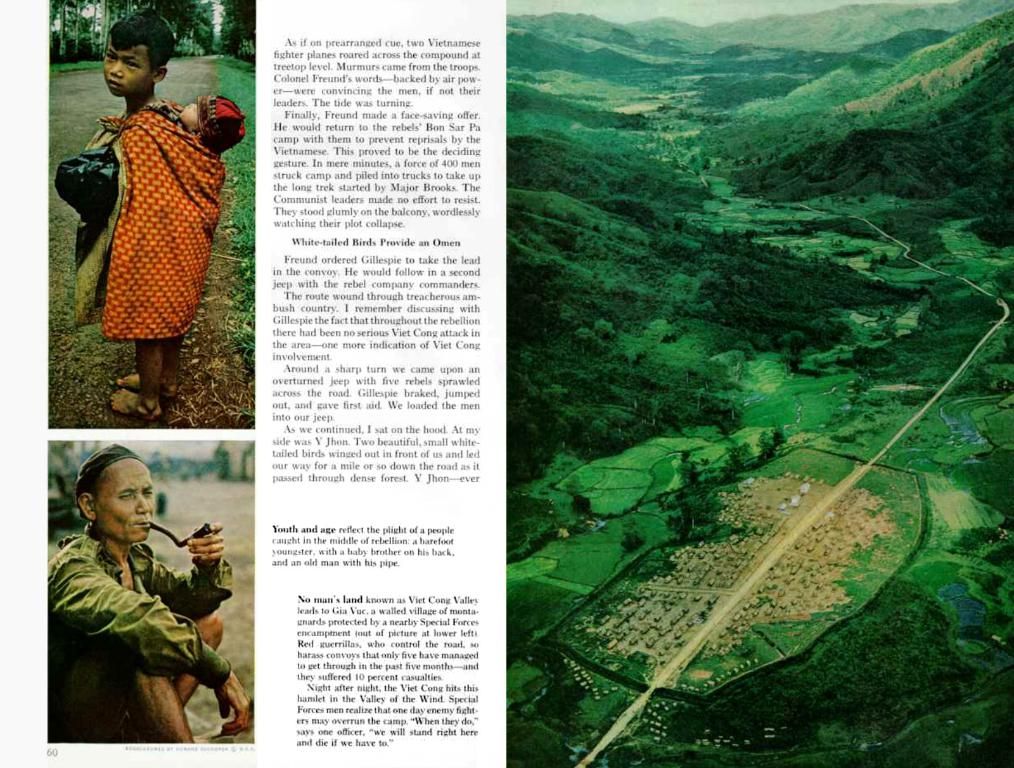Severe Famine Alerts Issued for Sudan, South Sudan, Gaza, Haiti, and Mali by the United Nations
Revamped Outlook on Global Food Crises
Get ready to dive into the alarming state of food security across the globe. The populations of Sudan, South Sudan, Gaza, Haiti, Mali, Yemen, the Democratic Republic of the Congo, Myanmar, and Nigeria are teetering on the brink of disaster without immediate action, according to a recent report by the UN.
This sobering report, released bi-annually by the United Nations Food and Agriculture Organization (FAO) and the World Food Programme (WFP), points to a worsening food crisis due to rising conflict, difficulties in accessing aid, and a drop in funding from significant donors like the United States.
Without urgent humanitarian intervention, 13 countries and territories are projected to see a severe deterioration of acute food insecurity. Apart from the five aforementioned regions, the report draws attention to Yemen, the Democratic Republic of the Congo, Myanmar, and Nigeria, which demand immediate focus to save lives.
"This report is a code red. We are aware of where hunger is escalating and who is at risk, but without financing or access, we can't prevent tragedies," declared Cindy McCain, WFP's executive director.
In Gaza, the risk of famine rises as large-scale military operations by Israel limit the ability to deliver essential humanitarian assistance, the report asserts. By September, over two million Gazans could be in a critical or worse situation, with around 470,000 on the brink of catastrophe, the last level prior to famine.
The situation in Sudan continues to deteriorate, with nearly 7.7 million people – more than half the population – facing food insecurity that is deemed crisis-level or worse. To make matters worse, the UN anticipates that the conflict and displacement will persist, and the situation will not improve.
While South Sudan's overall population faces acute food insecurity, nearly 7.7 million people (approximately 57% of the population) are confronting high levels of acute food insecurity. Worsening conflict, macroeconomic instability, and flooding are the main culprits[1][3]. Furthermore, 2.3 million children under five are acutely malnourished, with a 10.5% increase in the past six months[2]. The conflict in Upper Nile state also poses a significant threat to food security, with two counties potentially facing famine[3][4].
Currently, Mali faces the risk of worsening food insecurity due to conflict, high food prices, and potential flooding. By September, around 1.5 million people may find themselves in crisis or even worse conditions[1].
- Insight: It's crucial to provide emergency food aid, ensure safe access for aid workers to reach vulnerable populations, support local economies, and promote peace processes to reduce conflict-related displacement and food insecurity. For South Sudan, it's vital to enhance emergency food distribution, support school meals, and improve livelihoods[1][3]. In Mali, humanitarian access constraints in northern and central regions must be addressed, and efforts should be made to counter the impact of high food prices[1].
- References:[1] UN Humanitarian Response Plan, (2022). Retrieved from https://reliefweb.int/report/south-sudan/south-sudan-humanitarian-response-plan-2022[2] UNOPS Rapid Response Mechanism, (2022). Retrieved from https://www.unops.org/resources/news/ongoing-crisis-exacerbates-acute-malnutrition-south-sudan[3] ACAPS, (2022). South Sudan Food Security Situation Report, February 2022. Retrieved from https://acaps.org/node/34682[4] Famine Early Warning Systems Network (FEWS NET), (2022). Famine Early Warning System Network Gaza Conflict Outlook, February 2022. Retrieved from https://www.fews.net/sites/default/files/Food-and-Nutrition-Security-in-Gaza-After-the-Israeli-Assault-on-Gaza-Strip-February-2022.pdf
- The war-and-conflicts in Yemen, the Democratic Republic of the Congo, Myanmar, and Nigeria, highlighted in the UN report, are contributing to a worsening global food crisis.
- The general news about the increasing crime-and-justice and accidents, such as large-scale military operations in Gaza and conflicts in South Sudan, are disrupting humanitarian aid efforts and exacerbating food insecurity.
- Efforts to address the fires in Sudan and potentially flooding in Mali, alongside political negotiations to reduce conflicts, are crucial for preventing cultural devastation and maintaining a stable food supply in these countries.








